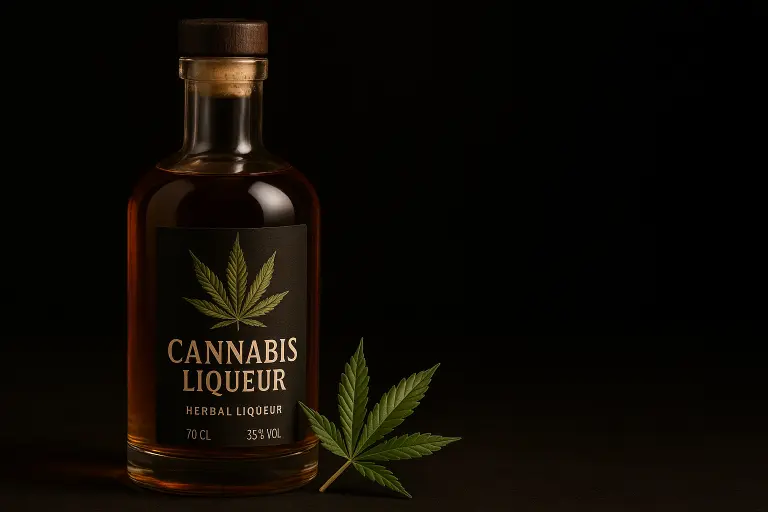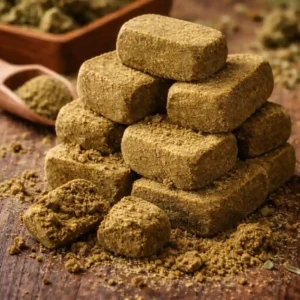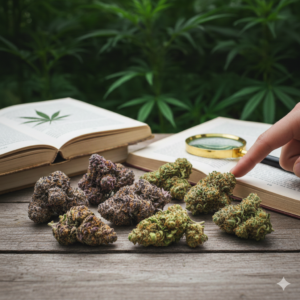What Is Marijuana Liqueur?
Marijuana liqueur is an alcoholic beverage infused with extracts of Cannabis Sativa. It’s usually crafted without THC, which means it doesn’t cause any psychoactive effects. Instead of serving a medicinal purpose, it offers a sensory experience — a unique flavor profile with herbal, spicy, and slightly sweet notes.
When made from industrial hemp, it’s fully legal in many countries and can be enjoyed just like any other liqueur: neat, over ice, or as part of a cocktail. Unlike cannabis alcohol (used topically for therapeutic purposes), marijuana liqueur is designed to be drunk and savored.
Key Characteristics of Marijuana Liqueur
Marijuana liqueur typically comes with an alcohol content ranging between 14% and 28%, depending on the distilling process. Visually, it often has a clear or slightly greenish hue, while its flavor blends herbal notes with spices like cardamom or juniper, rounded out by subtle hints of vanilla or citrus.
The infusion is made from Cannabis Sativa flowers or extracts sourced from controlled, pesticide-free crops, ensuring a natural, high-quality, and environmentally friendly product.
Handcrafted Marijuana Liqueur: Flavor, Tradition & Sustainability
One of the hallmarks of marijuana liqueur is its artisanal production. Many modern distilleries, including those collaborating with Weedestiny, combine traditional techniques with a strong focus on sustainability. The hemp flowers are often hand-harvested and left to dry naturally, without artificial dryers or chemicals.
This approach allows the liqueur to preserve the plant’s authentic aromas, resulting in a drink with real body, a smooth mouthfeel, and a distinctive identity. Each sip reveals the earthy hemp character, balanced with spice and natural sweetness, creating a truly memorable tasting experience.
Benefits & Sensory Qualities of Marijuana Liqueur
Although marijuana liqueur is an alcoholic drink, it has been appreciated for its sensory benefits. Thanks to the natural compounds in hemp, many people describe experiencing a gentle sense of relaxation and calm when enjoying it. Especially in small amounts or as a digestif.
Because most versions are made without THC, they are fully legal in many countries, including Spain, provided they use industrial hemp with less than 0.2% THC.
How to Enjoy Marijuana Liqueur
Marijuana liqueur is incredibly versatile. It can be sipped neat, served over ice, or used as a creative base for cocktails. Its herbal, slightly sweet profile makes it a great match with fruit juices, citrus sodas, or tonic water.
Some popular combinations include:
Marijuana liqueur with lime and mint (a herbal twist on a mojito)
Mixed with pineapple juice and ice for a tropical vibe
Added to coffee or tea for an aromatic touch
Blended into a spiced digestif cocktail
Beyond drinks, it’s also used in gourmet cooking and baking, where it adds unique flavor to sauces, reductions, and desserts.
Marijuana Liqueur vs. Cannabis Alcohol: What’s the Difference?
It’s important not to confuse marijuana liqueur with cannabis alcohol (also known as cannabis tincture). While marijuana liqueur is crafted for drinking and enjoyment, cannabis alcohol is designed for topical use with therapeutic purposes.
Cannabis tinctures are usually made by soaking decarboxylated cannabis in high-proof alcohol. Traditionally, they’re used in natural medicine to help with muscle pain, inflammation, or certain skin conditions. They are not meant to be consumed as a drink.
Marijuana liqueur, on the other hand, is developed for culinary and sensory experiences. Its role is gastronomic, not medicinal, and its purpose is to be enjoyed socially, much like any other artisanal spirit.
What Happens When You Mix Marijuana and Alcohol?
Combining marijuana with alcohol can intensify the effects of both substances, often leading to a stronger — and sometimes less predictable — experience. If a marijuana liqueur contains THC (most commercial ones do not), alcohol can act as a vasodilator, which makes the body absorb THC faster and more intensely.
This may result in sensations such as euphoria, altered perception, or a stronger sense of disinhibition compared to consuming either substance alone. On the downside, it can also increase the risk of nausea, dizziness, anxiety, confusion, or even fainting.
Since alcohol impairs judgment, it’s easy to consume more marijuana than intended, raising the chances of negative side effects. For frequent use, the combination can also have long-term health risks.
How Long Does Marijuana Distillate Stay in the Urine?
The answer depends on whether the liqueur contains THC. This is the compound that lingers in the body after consumption and shows up on drug tests.
With THC-free marijuana liqueurs (like Weedestiny’s), there are no detectable traces in urine tests.
With homemade or artisanal liqueurs that do contain THC, traces can last much longer.
For occasional consumers, THC may be detectable for 3 to 10 days.
For regular or heavy users, it can remain for 30 to 60 days, since THC is fat-soluble and stored in body fat, being released slowly over time.
Other factors like product potency, dosage, metabolism, and physical activity can also influence detection time.
Alcohol combined with THC can temporarily raise THC levels in the blood, which may also affect test results.
In short: THC-free marijuana liqueurs leave no trace, while THC-infused versions can stay in the system for weeks depending on frequency and personal factors.
What Not to Mix with Marijuana
When consuming marijuana — especially recreationally or in combination with alcohol — it’s important to be aware of potentially dangerous mixes.
Even though THC-free marijuana liqueurs like Weedestiny’s are completely safe, cannabis in general should not be combined with certain substances:
Psychotropic medications (antidepressants, anxiolytics, antipsychotics): Cannabis can interfere with their metabolism and intensify side effects such as drowsiness, confusion, or low blood pressure.
Stimulants (excessive caffeine, cocaine, amphetamines): The clash between cannabis’ relaxing effects and stimulants can trigger anxiety, rapid heartbeat, or nervous breakdowns.
Alcohol: While THC-free hemp liqueur is harmless, mixing alcohol with psychoactive cannabis can amplify motor impairment, dizziness, and loss of control.
Highly processed foods with lots of sugar and fat: These can worsen dehydration and cause stomach discomfort when paired with marijuana.
In medical or therapeutic contexts, it’s always best to consult a healthcare professional before mixing cannabis with medications or supplements.
Is Alcohol More Harmful to the Brain Than Marijuana?
The impact of alcohol and marijuana on brain health has been widely studied, and most experts agree that alcohol is generally more damaging, especially when consumed heavily or frequently.
Alcohol acts as a neurotoxin. Over time, it can harm brain structure, particularly areas like the hippocampus and prefrontal cortex — regions responsible for memory, decision-making, and self-control. Chronic use may shrink brain volume and impair cognitive functions.
Marijuana’s effects, on the other hand, depend on age, frequency, and dosage. In adults, moderate use rarely causes severe brain damage. But in adolescents, THC can interfere with brain development, since their nervous system is still maturing. This may disrupt neural connections and affect long-term cognitive function.
Cannabis Alcohol: Contraindications You Should Know
Cannabis alcohol, especially in its topical form, is generally considered safe. Still, there are a few important precautions:
Do not apply on damaged skin, open wounds, or severe burns, as it may cause irritation or a strong burning sensation.
People with sensitive skin or conditions such as psoriasis or eczema should consult a doctor before use.
Avoid combining it with other topical medications or cosmetics without medical guidance.
Always test on a small skin area first to rule out allergic reactions.
It’s also worth noting that this product is intended for external use only. It should never be ingested or applied near mucous membranes, eyes, or intimate areas. Pregnant women and people under medical treatment should consult a healthcare professional before use.
Cannabis Alcohol: Real User Opinions
Most opinions on cannabis alcohol are positive, particularly when it is used topically for muscle pain, inflammation, or skin problems. Many people see it as a natural and effective alternative to traditional pain relievers. Users often highlight its quick absorption, calming effect, and ease of application. It is especially valued in therapeutic massages, where it helps relax muscles and relieve both chronic and temporary discomfort. It is also commonly used as a home remedy for minor irritations, bruises, or post-exercise muscle tension.
That said, confusion often arises between cannabis alcohol and marijuana liqueur. While cannabis alcohol is applied to the skin and has no psychoactive effects, marijuana liqueur is an alcoholic drink infused with hemp or cannabis, designed for sensory enjoyment. Products such as Weedestiny’s liqueur, which contain no THC, are safe for consumption and should not be mistaken for topical treatments.
Some reviews note possible irritation in people with sensitive skin or when used excessively. These issues are usually resolved by adjusting the dosage or application method.
In summary, reviews of cannabis alcohol support its use in therapeutic contexts, as long as it is applied responsibly and with a clear understanding of its properties. The key lies in choosing high-quality products and following proper usage guidelines.
Cannabis Alcohol in Pharmacies: Can It Be Bought Legally?
Cannabis alcohol has been gaining popularity as a natural therapeutic product, which raises many questions about its availability in pharmacies. In Spain and other European countries, it is possible to find cannabis alcohol in pharmacies, but only under certain conditions. To be marketed legally, it must be made from industrial hemp, meaning it contains less than 0.2% THC. This type of alcohol does not produce psychoactive effects and is intended exclusively for topical use, such as massages or to relieve muscle discomfort.
It is important to note that cannabis alcohol is not an official medicine, but rather a cosmetic or herbal product. Because of this, it is not always available in every pharmacy and is more commonly found in pharmacies with a natural products section. It is also sold in herbal shops, organic stores, and online retailers.
At the same time, cannabis alcohol should not be confused with marijuana liqueur, which is an alcoholic beverage infused with hemp, designed to be consumed like any other spirit. Unlike cannabis alcohol, marijuana liqueur is not used on the skin and has no recognized therapeutic properties.
In conclusion: yes, cannabis alcohol can be purchased in pharmacies, as long as it complies with legal requirements and is sold for external use. To avoid confusion or low-quality products, it is advisable to carefully read labels and choose brands with clear formulations and proper health controls.
Cannabis Alcohol: Therapeutic Benefits and Common Uses
Cannabis alcohol offers a wide range of benefits, especially when applied topically. It is prepared by macerating hemp flowers in high-proof alcohol, which extracts cannabinoids and terpenes with therapeutic properties.
One of its main benefits is its analgesic effect. It is often used to relieve muscle and joint pain, making it useful for conditions such as arthritis, contractures, or minor sports injuries.
It also has anti-inflammatory properties. Thanks to cannabinoids like CBD, cannabis alcohol can help reduce swelling and improve circulation in affected areas. In addition, it acts as a natural antiseptic, which makes it suitable for use on bruises, contusions, or minor skin irritations. Some people use it to ease conditions such as eczema, psoriasis, or dermatitis, although it is always advisable to consult a dermatologist before applying it to affected areas.
Beyond its therapeutic applications, cannabis alcohol is popular in relaxing massages, as it helps reduce muscle tension and provides a calming sensation on the skin. Its fast absorption allows localized action without leaving a greasy residue.
It is important not to confuse cannabis alcohol with marijuana liqueur, which is a completely different product. While marijuana liqueur is intended for recreational consumption, cannabis alcohol is for external use only and has therapeutic applications.
In summary: cannabis alcohol is a natural, effective option increasingly valued by those seeking relief without synthetic drugs. However, it should always be used responsibly and in line with its intended purpose.
Marijuana Alcohol: Key Benefits and Contraindications
Marijuana alcohol, also known as cannabis tincture or cannabis extract, has been used for centuries for its medicinal and therapeutic properties. It is made by macerating Cannabis Sativa flowers in high-proof alcohol, which extracts active compounds such as CBD and, in some cases, THC.
One of its most recognized benefits is its analgesic and anti-inflammatory action. Applied topically, it helps relieve muscle, joint, and rheumatic pain. It can also soothe skin irritations such as eczema or dermatitis.
In therapeutic massage, cannabis alcohol is valued for improving circulation and helping relax tense areas, creating a localized sense of well-being. Its fast absorption makes the effects noticeable shortly after application.
However, there are also important contraindications. Marijuana alcohol should not be applied to open wounds, damaged skin, or sensitive areas such as the eyes or mucous membranes. People with very sensitive skin, known allergies to cannabis, or chronic skin problems should consult a specialist before using it. It is also not recommended for pregnant or breastfeeding women, nor for minors.
It is essential to distinguish this product from marijuana liqueur, which is a recreational beverage with no medical applications. While liqueur is meant to be enjoyed socially, marijuana alcohol has a therapeutic and external use.
In summary: marijuana alcohol provides notable relief for muscle and skin issues, but it must be used responsibly and with awareness of its limitations to avoid adverse effects.




